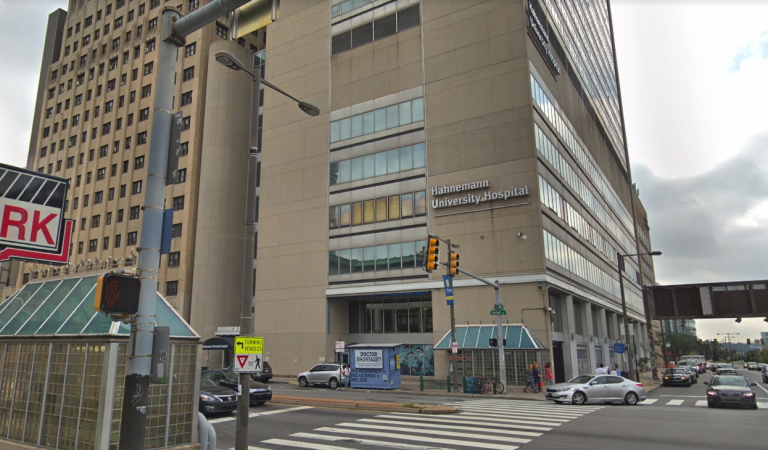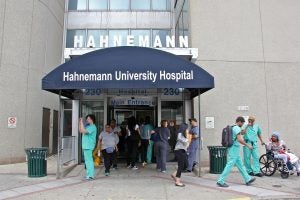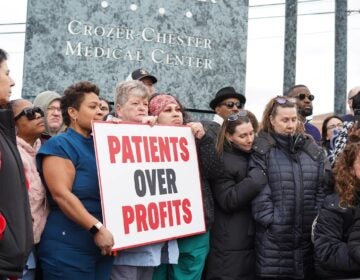CEO outlines plan to save Hahnemann University Hospital
A decision on the future of Hahnemann University Hospital will likely be made within the next 30 to 45 days, according to the CEO of their parent company.

Hahnemann University Hospital (Google maps)
This story originally appeared on The Philadelphia Business Journal.
—
A decision on the future of Hahnemann University Hospital will likely be made within the next 30 to 45 days, according to the CEO of the Philadelphia tertiary-care center’s parent company.
“We do see a pathway to stability, but we don’t control all the moving parts,” said Joel Freedman, the president and CEO of American Academic Health System. “We are hopeful we won’t have to close the hospital, but it will require the help of others.”
The pathway, Freedman said, includes taking a hard look at whether to continue service lines — such as cardiology — that are not contributing positively to the hospital bottom line. Other steps include working with Drexel University to make changes to the academic training program that is operating at a substantial loss. American Academic is also working on getting improved rates from private health insurers and receiver higher supplemental payments from the state to offset the underfunded care it provides to Medicaid patients.
California-based American Academic Health System, an affiliate of Paladin Healthcare, bought Hahnemann and St. Christopher’s Hospital for Children from Tenet Healthcare Corp in January 2018 for $170 million.
Freedman said while St. Christopher’s is generating a profit of about $1.5 million to $2 million per month, Hahnemann has been losing between $3 million and $5 million per month.
“Lately it’s been closer to $5 million,” he said.
Freedman did not absolve American Academic from blame in the hospital’s worsening financial condition.
“We’ve had management turnover and we haven’t executed as well as at other hospitals I’ve been involved with,” he said.
Freedman said American Academic is committed to not letting Hahnemann’s financial problems adversely impact St. Christopher’s, and the health system is exploring the possibility of converting the pediatric medical center into a nonprofit facility.
“We think many donors would support their mission if it was a nonprofit hospital,” he said, noting benefactors can’t claim charitable deductions to a gift to a for-profit hospital. “We are worried about Hahnemann threatening the viability of St. Christopher’s, and draining resources from St. Christopher’s. We won’t let that happen.”
Freedman cited four factors that have put Hahnemann’s long-term viability in jeopardy:
- The hospital, after executing short-time extensions with private payers after the leadership change, has not had any success in getting commercial insurers to negotiate new contracts.
- Volume has dropped from an average of 300 patients per day to between 200 to 250, which has made it difficult to cover the costs of the 24-hour-a-day staffing levels required for the high-end services the hospital provides.
- The academic training program it operates through its affiliation with the Drexel University School of Medicine, which has one of the largest medical school class sizes in the country, is on pace to lose $30 million this year. The hospital is only getting about 7 percent of its admission from physicians who are also faculty members. The vast majority of admissions are coming from patients coming into the emergency department who are on Medicaid or Medicare, which only pay a fraction of hospital charges. The high percentage of patients covered by government health insurance programs impacts the rate the hospitals gets for services provided by faculty physicians.
- The lack of clinical documentation training for physicians that has resulted in a “tremendous volume” of downgrades and denials from insurers. Freedman estimated that between denials and admissions being downgraded to observation status the hospitals is probably being paid for 50 percent of the services it provides.
Asked about its relationship with Hahnemann, Drexel University issued a statement that read:
“Drexel University College of Medicine continues to have an important academic affiliation and collaborative relationship with Hahnemann University Hospital, which is owned by American Academic Health System. Although Hahnemann is a key resource for the clinical education of Drexel’s medical students, the College of Medicine has academic affiliations with more than 20 clinical training sites.
“Drexel faculty continue their commitment to providing the best possible training for resident physicians employed by AAHS. Drexel cannot comment on the business affairs of AAHS, as Drexel’s financial and business operations are independent of the hospital. It is Drexel’s intention to maintain its current level of patient care and educational activities at the hospital. The College of Medicine’s focus is always on the best interests of its patients, students, faculty and staff.”
Donna Crilley Farrell, vice president of corporate communications at Independence Blue Cross, the region’s largest health insurer, said, “We have a long and positive history of engaging in open, continuous communication with hospitals and physicians in the region. While we can’t disclose the details of those conversations, we can assure you that American Academic Health System is part of them and that the focus is always on how we can collaborate to improve the quality and affordability of care for our members and their patients.”
Freedman said American Academic is taking steps to improve Hahnemann’s bottom line.
On Thursday, Hahnemann cut 175 jobs: 65 nurses, 22 service and technical employees and 88 nonunion workers and managers.
The Pennsylvania Nurses Association of Staff Nurses and Allied Professionals (PASNAP) on Friday called for an investigation Into cause of the layoffs at Hahnemann. “What we know is that Hahnemann’s nurses and workers did not cause the layoffs,” said Maureen May, president of PASNAP. “We have members who have worked at Hahnemann for decades, through multiple rounds of ownership, and have shown time and time again their commitment to patients in Philadelphia.”
Freedman said going forward all services lines are under review including cardiology. He said Hahnemann took a big hit last year when it lost its largest cardiology group to JeffersonHealth.
“We are also engaged with city and state officials and think they are very sympathetic about the potential loss of Hahnemann and the effect it could have on the market,” Freedman said.
Freedman said unlike in other markets where after a “safety-net” hospital closes, Pennsylvania did not reallocate the supplemental payments St. Joseph’s Hospital — which closed in 2016 — received from the state to the other hospitals in the city, primarily Hahnemann and Temple University Hospital, that ended up caring for St. Joseph’s largely uninsured and underinsured patients. He said while Temple gets supplemental payments from the state of more than $100 million a year, or 10 percent of its total revenues, Hahnemann gets far less at 17.2 million despite like Temple having an overwhelming majority of its patient covered by Medicaid and Medicare.
“Our revenues will be $600 million to $700 million,” Freedman said. “If we got 10 percent of that from the state we’d be stable.”
WHYY is your source for fact-based, in-depth journalism and information. As a nonprofit organization, we rely on financial support from readers like you. Please give today.




